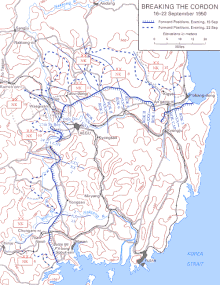This article relies largely or entirely on a single source. (September 2019) |
| Pusan Perimeter offensive | |||||||
|---|---|---|---|---|---|---|---|
| Part of the Korean War | |||||||
 Map of the Pusan Perimeter breakout | |||||||
| |||||||
| Belligerents | |||||||
|
| |||||||
| Commanders and leaders | |||||||
|
|
| ||||||
| Units involved | |||||||
|
| |||||||
| Strength | |||||||
| 140,000 | 70,000 | ||||||
The Pusan Perimeter offensive was a large-scale offensive by United Nations Command (UN) forces against North Korean forces commencing on 16 September 1950.
UN forces, having been repeatedly defeated by the advancing North Koreans, were forced back to the "Pusan Perimeter", a 140-mile (230 km) defensive line around an area on the southeastern tip of the Korean Peninsula that included the port of Pusan. The UN troops, consisting mostly of forces from the South Korea and the United States (US) mounted a last stand around the perimeter, fighting off repeated North Korean attacks for six weeks as they were engaged around the cities of Taegu, Masan, and Pohang and the Naktong River. The massive North Korean assaults were unsuccessful in forcing the UN forces back further from the perimeter, despite two major pushes in August and September. Following the UN counterattack at Inchon on 15 September, on 16 September UN forces within the Pusan Perimeter mounted an offensive to drive back the North Koreans and link up with the UN forces at Inchon.